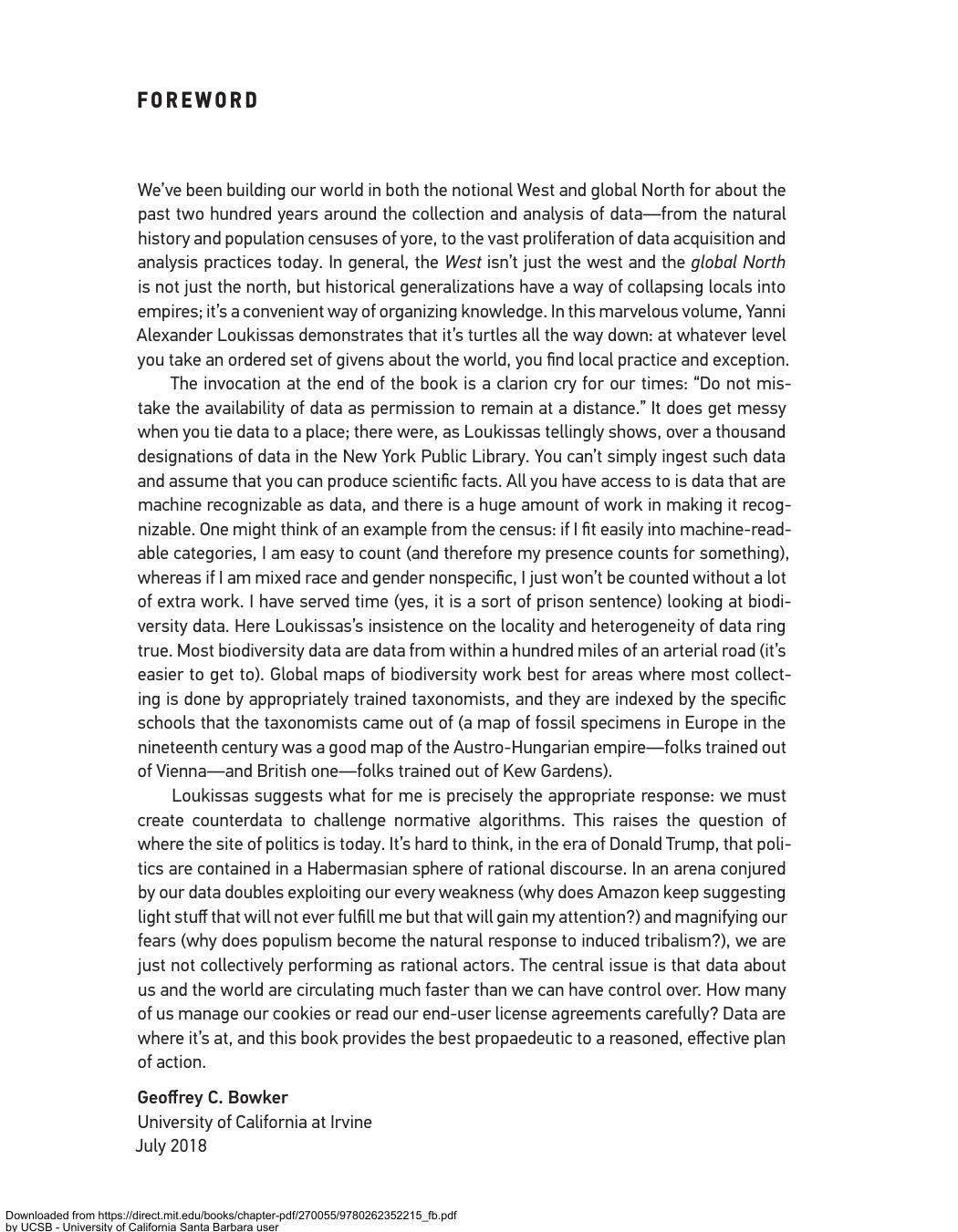All Data Are Local: Thinking Critically in a Data-Driven Society by Yanni Alexander Loukissas

Author:Yanni Alexander Loukissas [Loukissas, Yanni Alexander]
Language: eng
Format: epub, pdf
Tags: computers, Social Aspects, Technology & Engineering
ISBN: 9780262039666
Google: VTyUDwAAQBAJ
Publisher: MIT Press
Published: 2019-04-30T00:26:18.410551+00:00
5.1âA view of downtown Atlanta from the Crowne Plaza hotel. Image by the author.
Whether you are looking for somewhere to live, a good meal, information about events in your area, or a ride to work, a new economy of interfaces stands ready to serve you through a series of transactions with data that can be carried out on any networked personal computing device.10 The data that enable these services are created at the local level, collected by civic institutions or crowdsourced from the users themselves. They are rapidly mobilized by data brokers, who build and maintain national- or international-scale data infrastructures for profit.11 The boosters of this new âsmartâ lifestyle are ushering in a new kind of individualism tailored for affluent and tech-savvy urban dwellers.
Consider their tag lines: Yelp, an online directory of restaurants, shopping, and other services, can make sure you âconnect with great local businesses.ââ12 Nextdoor, a placebased social media platform, invites you to âdiscover your neighborhood.ââ13 Uber, a networked car service, equates âgetting thereâ with personal freedom: âyour day belongs to you.ââ14 Zillow, the real estate website, will help you âfind your way home.ââ15 These interfaces promise not only access to data but also the operational context to easily act on them.
By operational context, I mean an interface that is procedurally generated from computer code, and composed of visual, discursive, and algorithmic processes that connect existing data to concepts as well as resources that can support their use. Indeed, interfaces are not places per se. Rather, as media theorist Alexander Galloway notes, interfaces are best understood as processes.16 Visual processes, such as mapping or graphing, help users see patterns in data. Discursive processes offer ready-made narratives through which to frame those patterns as reality. Algorithmic processes enrich data by generating new value from existing inputs. These interface elements are more than representational because they transform data on the cityâfor instance, in terms of prices, distances, and rankingsâinto drivers for local and highly personalized behavior. As in the example of the arboretum in chapter 2, data don't just describe contemporary places; they are a functional part of the way that those places work.
This chapter brings a local perspective to the question, What are interfaces to data? This entails an analysis of the various processes that shape the way we encounter data in applications, such as those described above. The question of the interface is of deep relevance for anyone who wishes to think critically about systems that mediate relationships between people and data. On the face of it, designing an interface is a pragmatic problem of supporting data use. But it is also a problem with important social and even political consequences. Who can use data? How can they use data? And what can they use data for? Interfaces establish the subject positions that users of data are expected to adopt.
In the case of Zillow, which I will focus on here, you can be a prospective home buyer, renter, seller, or real estate professional. No resident, according to Zillow, is outside the market.
Download
All Data Are Local: Thinking Critically in a Data-Driven Society by Yanni Alexander Loukissas.pdf
This site does not store any files on its server. We only index and link to content provided by other sites. Please contact the content providers to delete copyright contents if any and email us, we'll remove relevant links or contents immediately.
Exploring Deepfakes by Bryan Lyon and Matt Tora(8367)
Robo-Advisor with Python by Aki Ranin(8311)
Offensive Shellcode from Scratch by Rishalin Pillay(6429)
Microsoft 365 and SharePoint Online Cookbook by Gaurav Mahajan Sudeep Ghatak Nate Chamberlain Scott Brewster(5686)
Ego Is the Enemy by Ryan Holiday(5415)
Management Strategies for the Cloud Revolution: How Cloud Computing Is Transforming Business and Why You Can't Afford to Be Left Behind by Charles Babcock(4564)
Python for ArcGIS Pro by Silas Toms Bill Parker(4503)
Machine Learning at Scale with H2O by Gregory Keys | David Whiting(4295)
Elevating React Web Development with Gatsby by Samuel Larsen-Disney(4226)
Liar's Poker by Michael Lewis(3441)
Learning C# by Developing Games with Unity 2021 by Harrison Ferrone(3350)
Speed Up Your Python with Rust by Maxwell Flitton(3312)
OPNsense Beginner to Professional by Julio Cesar Bueno de Camargo(3283)
Extreme DAX by Michiel Rozema & Henk Vlootman(3263)
Agile Security Operations by Hinne Hettema(3191)
Linux Command Line and Shell Scripting Techniques by Vedran Dakic and Jasmin Redzepagic(3174)
Essential Cryptography for JavaScript Developers by Alessandro Segala(3144)
Cryptography Algorithms by Massimo Bertaccini(3086)
AI-Powered Commerce by Andy Pandharikar & Frederik Bussler(3052)
